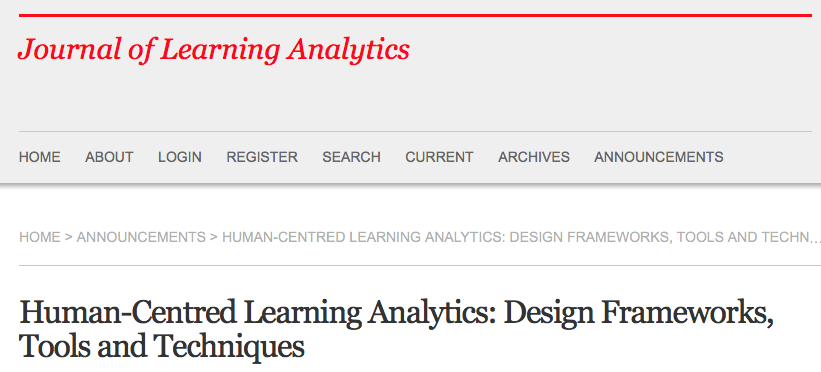Special Issue on Human-Centred Learning Analytics – JLA

GUEST EDITORS
Simon Buckingham Shum, University of Technology Sydney (Australia)
Rebecca Ferguson, The Open University (UK)
Roberto Martinez-Maldonado, University of Technology Sydney (Australia)
AIMS & SCOPE
An important feature of the learning analytics community is our interest in the human factors in learning analytics systems. When learning analytics tools are used, their success or failure must be judged not only on technical criteria, but also by their adoption and effectiveness in schools, universities and workplaces. Often this is where the gulf between hype and reality becomes apparent. The complexities of embedding innovative technology in authentic contexts open a range of critical challenges for the field. The theme of the 2018 Learning Analytics and Knowledge conference (LAK18) Towards User-Centred Design — how stakeholders can, or must, be engaged in the design, deployment and assessment of learning analytics. LAK18 also held its first Participatory Design workshop. We invite contributions to this special section that explore these issues in more depth.
TOPICS OF INTEREST
There are well-established research and design communities interested in human-centred design. The Human-Computer Interaction (HCI) community, for example, has worked hard to couple academic rigour with relevance in the fast-moving world of software design, evolving from an assemblage of disciplinary sciences towards practical design practices. Decades of work within communities under headings such as Participatory Design, User-Centred Design and Co-Design have led to many advances in theory, methodology and tools. ‘Human-centred’ can be defined at many levels, including the user interface, the impact on working practices, shifts in users’ power and control, and the values that are baked into the data models. The organisational obstacles to good user-centred design are well documented, since budget holders must be persuaded of the merits of investing money and effort in order to bring stakeholders into the design process. Most recently, of particular relevance to learning analytics, the user experience community has begun to engage with the specific challenges posed by interactive systems using machine learning. Building on decades of work in these communities, we need to apply and where necessary extend these approaches to the specific educational contexts in which we work. We therefore invite researchers and practitioners to submit theoretical, methodological, empirical and technical contributions including but not limited to:
- Experiences deploying design processes that explicitly involve stakeholders (such as learners, educators, instructional designers, and leaders) in the co-design, co-creation or participatory design of analytics tools.
- Evaluations of tools and techniques that have been effective in assessing how end-users make sense of, interact with, and act on analytics feedback.
- Examples of how learning analytics systems can be made more transparent and accountable to different stakeholder groups.
- Examples of how educational leaders can create the conditions for, or inadvertently undermine, human-centred learning analytics systems.
- Examples of the benefits (and costs) that the adoption of human-centred design tools and techniques can bring to stakeholders.
- Arguments/conceptual models/examples clarifying specific challenges of human-centred design for learning analytics, beyond those already well documented from other domains.
The special section will include two types of submission. First, invited extended versions of strong LAK18 papers on human-centred design. Second, additional papers submitted in response to this call. All submissions will undergo full peer review in accordance with JLA processes, in the context of their contributions to this call.
TIMELINE
Optional abstract pre-submission (see submission procedures): 1 June 2018
Deadline for submissions: 31 Oct, 2018
Target publication date: Issue 2 (July), 2019
SUBMISSION PROCEDURE
Prospective authors are encouraged, though not required, to submit an abstract of at most 300 words to the special-section editors in advance in order to check fit with the special section: Simon.BuckinghamShum@uts.edu.au; rebecca.ferguson@open.ac.uk; Roberto.Martinez-Maldonado@uts.edu.au
The editors will reply to authors of submitted abstracts with feedback within two weeks.
Final submissions will take place through JLA’s online submission system at http://learning-analytics.info
When submitting a paper, select the section “Special Section: Human-Centred Learning Analytics”.
All submissions should follow JLA’s standard manuscript guidelines and template available on the journal website, and will undergo peer review.
Queries may be sent to the special section editors (emails above).